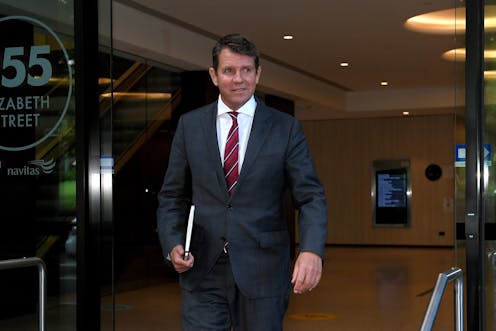After a bombshell day at ICAC, questions must be asked about integrity in Australian politics
- Written by Andy Marks, Pro Vice-Chancellor, Strategy, Government and Alliances, Western Sydney University

A few days into the current Independent Commission Against Corruption (ICAC) proceedings in NSW[1], and it appears two relatively popular[2] former NSW premiers and Cabinet colleagues – Gladys Berejiklian and Mike Baird – might hold markedly different views on integrity in public office.
In fact, Baird, who is not accused of any wrongdoing, told the hearing[3] he was “incredulous” when he found out about the relationship between Berejiklian and former MP Daryl Maguire, and believed she ought to have disclosed it.
In the wake of the ICAC hearings, questions are also emerging about the system surrounding, and potentially enabling, perceived actions of political integrity.
We are witnessing a moment that will test widely held assumptions about politics beyond NSW alone. Integrity has become stock and trade in Australian politics. It crystallises views on what is, and what isn’t, good government. Faith in political systems depends on it. Democracy requires us to trust the integrity of political structures, elections, parliament, and parliamentarians.
Read more: A federal ICAC must end the confusion between integrity questions and corruption[4]
The most experienced political actors know this. That’s why they return to the issue of integrity, repeatedly, both in the bluster of attack, and in the stiff resolve of defence. Berejiklian did just that in her recent resignation speech[5]. She said
History will demonstrate that I have always executed my duties with the highest degree of integrity for the benefit of the people of NSW.
That is precisely the proposition ICAC is testing. Its investigation[6] into whether Berejiklian engaged in conduct that “constituted or involved a breach of public trust” will substantially shape the historical record.
The integrity of the political processes behind the deployment of public funds in NSW has again been drawn into question. It is not the first time, and if we look at recent history, it may be that hints of structural vulnerability were emerging.
Asked late last year about accusations of pork barrelling Berejiklian replied, “It’s not an illegal practice[7]”. It was a curious response; a frank admission that electoral imperatives influence the stewardship of public resources. Nevertheless, she was right.
The integrity of the system is not, according to the NSW Ministerial Code of Conduct[8], compromised if ministers make decisions that might result in the “expectation that the manner in which a particular matter is dealt with will enhance a person’s or party’s popular standing”.
But, the code warns, ministers do “have a responsibility to avoid or otherwise manage appropriately conflicts of interest to ensure the maintenance of both the actuality and appearance of Ministerial integrity”. That’s the issue here.
The current ICAC proceedings are examining whether the former premier – who has denied wrongdoing – failed to declare a “conflict of interest” regarding her relationship with McGuire in relation to decisions on the allocation of public funds to particular projects in his electorate[9] of Wagga Wagga.
On this issue, the comments from Baird – Berejiklian’s predecessor – at ICAC were pointed. His remark that her relationship with Maguire “should have been disclosed[10]” goes to the heart of the matter.
The integrity of the deployment of public funds, in Baird’s view, relies on appropriate public disclosure. The varied treatment of that proposition, both politically and under the code, is becoming clearer. But what about the public service?
Public servants are there to advise ministers and ensure public monies are spent well. Indeed, the Government Sector Employment Act 2013[11] provides a list of four core values – integrity, trust, service and accountability. It also lists 18 principles guiding how these values should be implemented for those employed in the public service and wider government sector. In particular, the act requires public servants to make decisions that result in the fair provision of services.
Read more: ICAC is not a curse, and probity in government matters. The Australian media would do well to remember that[12]
Importantly, the act stipulates public servants should be “fiscally responsible and focus on efficient, effective and prudent use of resources”.
To protect public servants from compromise, the ministerial code specifies that ministers have a “responsibility to ensure that they do not act in a way that would place others, including public servants, in a position that would require them to breach the law or their own ethical obligations”.
But as with most sets of rules, exceptions apply. The code does not “limit Ministerial discretion to make decisions and direct departments in accordance with the principle of departmental responsibility to Ministers, including to disagree with advice and recommendations put to them by public servants”.
Where political integrity lies in all of this remains to be seen. If pork barrelling is okay, and disclosure discretionary, then the basis of public trust in politicians and political processes is also drawn into question.
At a time when a federal integrity commission seems a distant priority[13], and NSW proceedings have a distance to run, the integrity of Australian politics and democracy is being tested.
References
- ^ current Independent Commission Against Corruption (ICAC) proceedings in NSW (www.icac.nsw.gov.au)
- ^ relatively popular (www.afr.com)
- ^ told the hearing (www.theage.com.au)
- ^ A federal ICAC must end the confusion between integrity questions and corruption (theconversation.com)
- ^ resignation speech (www.nsw.gov.au)
- ^ investigation (www.icac.nsw.gov.au)
- ^ It’s not an illegal practice (www.theaustralian.com.au)
- ^ NSW Ministerial Code of Conduct (arp.nsw.gov.au)
- ^ the allocation of public funds to particular projects in his electorate (www.icac.nsw.gov.au)
- ^ should have been disclosed (www.smh.com.au)
- ^ Government Sector Employment Act 2013 (legislation.nsw.gov.au)
- ^ ICAC is not a curse, and probity in government matters. The Australian media would do well to remember that (theconversation.com)
- ^ federal integrity commission seems a distant priority (theconversation.com)

















